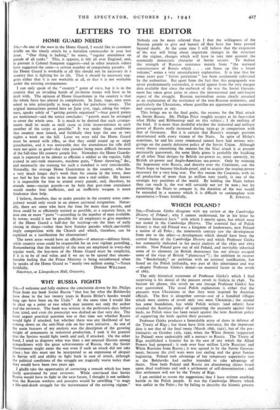LETTERS TO THE EDITOR
HOME GUARD NEEDS
SIR, As one of the men in the Home Guard, I would like to comment briefly on the timely article by a battalion commander in your last issue. " One thing is lacking," he states, "regular attendance on parade of all ranks." This, it appears, is felt all over England, and, to prevent it Colonel Sampson suggests—and in other journals others have suggested the same—a certain number of compulsory parades. If the Home Guard is workable at all this should not be necessary in a country that is fighting for its life. That it should be necessary sug- gests either that it is not workable at all, or that it is not workable under the existing arrangements.
I can only speak of the " country " point of view, but it is in the country that an invading horde of air-borne troops will have to be dealt with. The opinion of Home Guardsmen in the country is that the whole force has altered its complexion. In June, 194o, men were asked to join principally to keep watch for parachute troops. The original instructions posted here on June 31st, 1940, asking for volun- teers, speaks solely of " getting patrols organised "—four patrol points are mentioned—and the notice concludes: " patrols must be arranged to cover the whole area. It is much to be desired that such arrange- ments shall be 'made as shall cause as little inconvenience to each member of the corps as possible." It was under these conditions that country men joined, and faithfully they kept the one or two nights a week on the hill. Later we were told the Home Guard must be armed with rifles, so that they could round up or snipe parachutists, and it was noticeable that the attendances for rifle drill were not quite so good—day time parades being more difficult because of the full-time life country people live. Nowadays the Home Guards- man is expected to be almost as efficient a soldier as the regular, fully trained in anti-tank measures, machine guns, " flame throwing," &c., and necessarily the training for such a standard is very considerable. Naturally, the average Home Guardsman in the country, who has a very much longer day's work than his cousin in the town, does not feel he has the time to be made into a real soldier. He knows it is impossible for him to attend every parade, and, therefore, he attends none—except patrols—as he feels that part-time attendance would render him inefficient, and an inefficient weapon is more hindrance than help.
I believe, therefore, that to make parades in the country areas com- pulsory would only result in an almost universal resignation. Natur- ally, there are some who have the time for more than patrols, and these could be as efficiently trained as possible, as a separate force, to man one or more " posts "—according to the number of men available. In towns, would it not be possible for all employers to give members of the Home Guard a half-day for training—on the lines of early closing iii shops—rather than have Sunday parades which–inevitably imply competition with the Church and which, therefore, can be exploited as. a justification for •absenteeism?
The town areas would have an efficient—if amateur—defence force, while country areas could be responsible for an ever vigilant patrolling.. Remembering that the majority of the men are employed in every-day regular work, the key-note of the Home Guard must be simplicity, if it is to be of real value, and if we are to be spared that uncom- fortable feeling that the Prime Minister is being misinformed when he speaks of the Home Guard as " nearly two million strong."—Yours






















 Previous page
Previous page